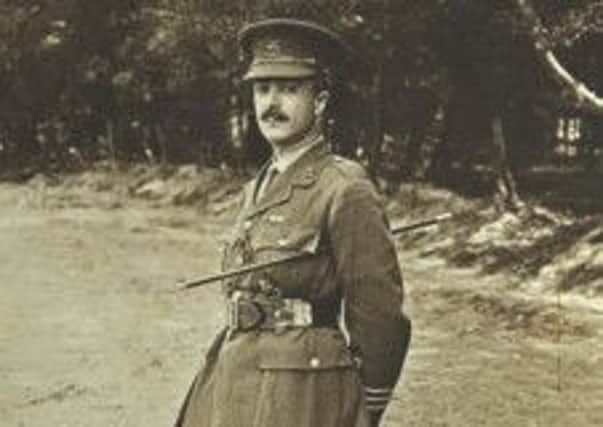First World War letters to go on display


At the outbreak of the war, Colonel Leonard Messel of Nymans in Handcross was debarred from active service on account of his German ancestry.
He therefore devoted his time to training battalions of the Royal East Kent Regiment known as the Buffs. These men wrote to him throughout the war.
Advertisement
Hide AdAdvertisement
Hide AdTo mark the centenary of the First World War, Nymans is displaying selected contents of some of the 491 letters Colonel Messel received, alongside audio recordings.
Visitors will also be able to discover the impact of the war on other people within the Nymans circle, from Leonard’s father Ludwig, who is said to have died broken-hearted by the conflict between the two nations he loved, to his wife Maud and her household who worked tirelessly at the nearby VAD hospital.
Highlights include:
l Leonard Messel’s personal copy of transcribed letters, which he carried with him and treasured. Known to be at least 70 years old, the book miraculously survived the devastating fire at Nymans in 1947.
l BBC radio recording featuring an interview with Leonard’s granddaughter Victoria Messel.
l Leonard Messel’s original First World War uniform.
Advertisement
Hide AdAdvertisement
Hide Adl A look at the anti-German sentiment and First World War propaganda of the time.
The personal nature of the soldiers’ letters illustrates the close bond that existed between the Colonel and his troops.
They also convey an unusual openness between men from very different social backgrounds, a blurring of the boundaries that had held Britain’s rigid class system in place.
Victoria Messel, Leonard’s grand-daughter, remembers: “Amazingly, I found this book of letters when turning out the house after the death of my aunt in 1992. How it survived the fire at Nymans, I simply don’t know; it’s like a phoenix rising from the ashes.
Advertisement
Hide AdAdvertisement
Hide Ad“Finding it hidden under the bookshelves in the nursery was like finding a Rubens. It was wonderful – one of the most precious things to come out of the house. You can hear voices from the past showing their affection for Lennie.”
For the soldiers of the Buffs, corresponding with Colonel Messel would have been one of the few opportunities to put in writing their personal experiences of life in the trenches; something that many of them would have kept hidden from loved ones back home:
‘You will guess by the address that I have been hit again but it’s not very much. The same night poor Sherren was killed instantaneously. We all miss him – he was splendid in the line. Far worse that the shelling, the machine gun and this new gas (which leaves big blisters) was the mud. It was indescribable. Several of my chaps went in up to their armpits and I am afraid quite a number never got out. Still – the stunt went splendidly’. - August 11, 1917, A Stanley Peters, 2/Lieut., Ward 05, No 8 General Hospital, Rouen
The Colonel continued to provide comfort and support to his men and their families throughout the war, writing personal notes to those whose sons were never to return:
Advertisement
Hide AdAdvertisement
Hide Ad‘Dear Col Messel, I had no idea until after his death what a favourite he (Harold) seems to have been with everyone; from the High Commis of New Zealand in whose employ he was, and all heads of departments, down to small shopkeepers in our neighbourhood who have spoken to me in the same strain. He was so awfully keen too, to get to the front, and to do his ‘bit’.
‘Again thanking you for your kind sympathy, and high opinion of our dear laddie (he had not quite reached his 20th birthday)’ - September 4, 1917, Geo: Hardey Mason, Modard, Queen’s Road, Wallington
The letters also highlight the Colonel’s understanding of the divide that existed between his own privileged lifestyle and the desperate personal circumstances of some of his soldiers.
Other letters bring home the tragic nature of the relationship that clearly existed (and which sometimes bordered on camaraderie) between British and German troops: ‘An attack was arranged for at two o’clock the second night but we were delayed until 2.30am. After getting about 250 yards we had to retire, the Germans getting to know that an attack was going to take place, ‘and shouting to us we were half an hour late’.
Advertisement
Hide AdAdvertisement
Hide Ad‘The most interesting work perhaps is going out to listen between the trenches; they are usually singing….’ - July 16 ,1915, Sergt Mitchell, G.H, B Coy, 8th Batt, A&S Highlanders, 51st Division, British Expeditionary Force
Nymans’ House Manager Rebecca Graham adds: “We are incredibly fortunate that the letters forming the basis of this exhibition have been so carefully looked after, firstly by Leonard Messel himself and then by his grand-daughter Victoria.
“Leonard had copies of the letters made into a book which he is said to have treasured, and which thankfully survived a huge fire at Nymans in 1947.
“We can only imagine what it must have been like for him, having to stay behind while the men he had trained gave their lives for their country.
Advertisement
Hide AdAdvertisement
Hide Ad“He must have written hundreds of letters to them, and to their families, which obviously gave them great solace. This is their story, and this is our tribute to them all.”
‘The Great War - Stories of a German family in England’ runs from 14 June to 31 August.
For further information, visit www.nationaltrust.org.uk/nymans or call 01444 405250
Report and picture contributed by the National Trust.